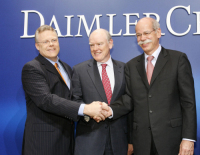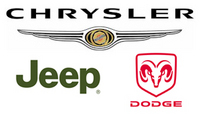Details of the DCX Sale of Chrysler to GMAC Investor Cerberus - Includes Video
 From left to right: Tom LaSorda, President and CEO – Chrysler Group, John W. Snow, Chairman of Cerberus Capital Management, L.P., and Dr. Dieter Zetsche, Chairman of the Board of Management of DaimlerChrysler AG and Head of the Mercedes Car Group |
 |
SEE ALSO: Video of Press Conference
SEE ALSO:Dieter Zetsche Press Announcemt on Sale
SEE ALSO: Daimler Chrysler Merger, Historic Press Conference and Merger Details
FRANKFURT, May 14, 2007 Michael Shields writing for Reuters reported today that private equity firm Cerberus will buy a majority of DaimlerChrysler's struggling Chrysler Group for $7.4 billion, a fraction of the $36 billion deal that created the transatlantic car union nine years ago.
Cerberus Capital Management gets an 80.1 percent stake in Chrysler and its related financial services business, DaimlerChrysler said on Monday, ending what was billed as a marriage made in heaven but never lived up to the name.
The deal, months in the making and set to close in the third quarter of the year, puts a major U.S. automaker in the hands of a private equity group for the first time.
"Cerberus is the right strategic buyer for Chrysler, with a long-term commitment to Chrysler's growth and success. They are committed to working constructively with both union leadership and Chrysler's management team to help Chrysler realise its full potential," Chrysler President Tom LaSorda said.
He said the deal would not trigger job cuts beyond the 13,000 Chrysler announced in February, when it unveiled a $1.5 billion 2006 operating loss as customers, spooked by high fuel prices, fled its portfolio of pickup trucks and sport utility vehicles.
The accord calls for Chrysler to retain billions of dollars in pension and healthcare obligations for its workers and will result in a net cash outflow of 500 million euros ($677 million) for DaimlerChrysler, now the world's fifth-biggest carmaker. The German company -- whose name will change to Daimler AG if shareholders approve -- will contribute another 650 million euros to cover long-term liabilities at Chrysler, it said.
It estimated the deal will cut DaimlerChrysler's 2007 net profit by 3-4 billion euros.
Cerberus Chairman John Snow said Chrysler would benefit from dropping out of the public spotlight for a time.
"Our approach is fundamentally long term. We don't think about the next quarter. We don't think about what analysts have to say about us," he told a news conference in Stuttgart.
"Our capital is patience."
DaimlerChrysler Chief Executive Dieter Zetsche said the deal -- announced three months to the day after the group said it was examining all options for Chrysler -- ensured Chrysler's future while eliminating risks for its German cousins.
He admitted that architects of the groundbreaking merger had overestimated the synergies they could get from the deal because U.S. customers for Chrysler cars were unwilling or unable to pay premium prices for cutting-edge technology made in Germany.
The deal breaks up a product lineup that yoked American mass-market brands Jeep, Dodge and Chrysler with Germany's premium Mercedes-Benz, luxury Maybach and Smart minicar brands at a time of wrenching restructuring for the U.S. auto industry. DaimlerChrysler stock rose as much as 7.8 percent on the news and was up 3.6 percent at 62.79 euros by 1335 GMT, by when more than four times a normal day's volume had traded.
"Even though I don't think there is a very strong valuation story, there is a very strong visibility story. One of the great parts of uncertainty surrounding Daimler is now not so uncertain," said Nomura analyst Michael Tyndall.
UNION WELCOMES DEAL
Bidders that publicly said they were vying for Chrysler are Kerkorian's Tracinda Corp. and Canadian autoparts maker Magna International. Private equity firm Blackstone Group also pursued Chrysler, and was said to be linked up with smaller buyout firm Centerbridge Partners.
New York-based Cerberus is a private investment fund that has built a huge private equity and hedge-fund practice. It hired Wolfgang Bernhard, who helped turn Chrysler around early this decade, as an adviser on the deal, but Snow said Bernhard would not play an active management role there again.
One key to the deal is the company's unfunded healthcare liabilities related to Chrysler's contracts with its United Auto Workers-represented factory workers. These stood at around 14.1 billion euros at the end of last year.
DaimlerChrysler said Chrysler would keep the liabilities. UAW President Ron Gettelfinger, the only U.S. labour representative who sits on DaimlerChrysler's supervisory board and had publicly opposed a sale to a private equity buyer, hailed the deal.
"The transaction with Cerberus is in the best interests of our UAW members, the Chrysler Group and Daimler," he said. German labour representatives also support it, Zetsche said.
Chrysler aims to return to profits in 2008. A main hurdle, analysts say, is its ability to clinch a new contract with the UAW that reduces costs, particularly for healthcare, when the current contract expires in September.
"That unfunded healthcare really determines how much the business is worth," Nomura's Tyndall said.
Cerberus has experience with the auto industry. General Motors Corp. sold a 51-percent stake in its financing arm, GMAC, to a consortium led by Cerberus in a deal worth about $14 billion last year.
There was additional reporting for Reuters by Knut Engelmann and Hans Nagl in Frankfurt, Hendrik Sackmann in Stuttgart, Megan Davies and Michael Flaherty in New York and Kevin Krolicki in Detroit


